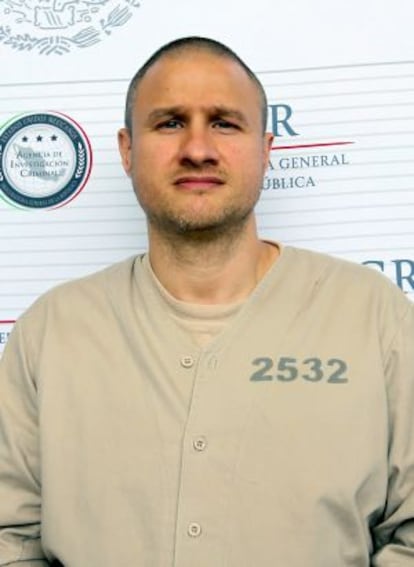Mexico hands over 13 dangerous criminals to US authorities
Government reactivates extradition policy in wake of drug baron ‘El Chapo’s’ escape Notorious Texas-born cartel hitman ‘La Barbie’ among those sent

Mexico extradited 13 dangerous suspects wanted on federal charges related to drug-trafficking and murder to the United States on Wednesday, in a move aimed at restoring confidence and cooperation with Washington in law enforcement matters.
Among those handed over to US officials by the government of President Enrique Peña Nieto were legendary hit squad leader Édgar Valdez Villarreal, known as La Barbie, and Jorge Costilla-Sánchez, El Coss, the purported former leader of the Gulf cartel.
The extraditions come after the embarrassment caused to the Peña Nieto administration by the daring escape in July of Sinaloa cartel chief Joaquín El Chapo Guzmán Loera from a maximum security prison through a long tunnel dug under his cell.
Just weeks before his escape, US authorities had asked Mexico to extradite El Chapo, but Mexican officials insisted on putting him on trial and letting him serve time in their own country before sending him to the United States.
El Chapo’s lawyer later said that his client decided to flee after he learned about the extradition request. The Sinaloa cartel chief is still at large.
Extraditions were dramatically reduced when Peña Nieto of the PRI came to office
During his 2006-2012 term in office, President Felipe Calderón enforced a tough extradition policy and used it as one of his main weapons in the government’s war against the cartels, which left around 80,000 people dead and 20,000 others missing.
The strategy served to demonstrate his close relationship with Washington as well as prevent traffickers and other suspects from manipulating Mexico’s prison system.
Extraditions were dramatically reduced when Peña Nieto, of the Institutional Revolutionary Party (PRI), came to office and announced a new security plan designed to show that Mexico was capable of capturing drug criminals, putting them on trial, and sending them to jail.
At the same time, public opinion was in favor of reducing the continued interference in Mexico’s anti-drug operations by the United States.
But El Chapo’s escape has forced the Peña Nieto government to rethink this policy.
On Wednesday, US Attorney General Loretta Lynch praised Mexico’s move and called it “a new era of cooperation.”
“I am grateful to our Mexican counterparts not only for their assistance with this important matter, but also for their extraordinary efforts and unwavering partnership in our ongoing fight against international organized crime. I look forward to all that we will continue to accomplish in the service of that mission as we build on these achievements together in the days and months ahead,” Lynch said in a statement.
The crimes allegedly committed by the extradited suspects include murder, money laundering, drug trafficking and rape. Among the group are three members of the so-called Barrio Azteca gang who are wanted for the March 2010 murders of US Consulate employee Leslie Ann Enriquez Catton, her husband Arthur Redelfs, and Jorge Alberto Salcido Ceniceros, the husband of another consulate employee, in Ciudad Juarez.
But La Barbie and El Coss are the biggest fishes in the group.
A former police official, El Coss became the boss of the Gulf Cartel in 2003 after its former leader Osiel Cárdenas was arrested. He initiated a bloody war against his rivals from the organization’s base in Tamaulipas but his power was eventually weakened and he lost the cartel’s leadership. Mexican authorities arrested him on September 12, 2012.
Video: Police interrogation of Valdez Villarreal in 2012 (in Spanish).
‘La Barbie’ and ‘El Coss’ are the biggest fishes in the group
La Barbie’s past is even darker. Born in Texas, he decided not to attend university so he could dedicate his life to drug trafficking. In the early 1990s, he fled to Mexico after authorities began looking for him.
He became a top lieutenant to the late Arturo Beltrán Leyva, who later led his own faction of the Beltrán Leyva cartel. La Barbie was known for allegedly corrupting officials and mutilating and torturing his enemies. Videos of mass executions and beheadings of his rivals appeared on the internet.
After Beltrán Leyva died, La Barbie became chief hitman for El Chapo but was eventually captured on August 30, 2012.
English version by Martin Delfin.







































